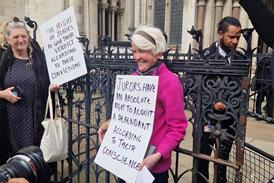A trainee solicitor who was accused of making a misleading comment during an appraisal meeting with his firm has had all allegations against him dismissed by the Solicitors Disciplinary Tribunal.
William Amo, an unadmitted individual, was employed by US-based Holland & Knight LLP first as a paralegal and then as a trainee solicitor. He was alleged to have represented during an appraisal meeting that he had not failed any LPC examinations or modules which was untrue/misleading. Amo denied the allegations in their entirety.
The SDT’s 18-page judgment found that the case ‘rested upon the recollection and memory of the witnesses there being no objective contemporaneous record of the questions put to Mr Amo and the answers he gave in the meeting’.
In dismissing all the allegations, the three-person tribunal said it ‘could not find the allegations proved to the requisite standard’.
Amo was working as a trainee solicitor at the same time as studying for his LPC, an ‘unusual’ practise for the firm. Amo failed his litigation in examination and a re-sit was scheduled for early January 2020.
In late January 2020, Robert Ricketts, compliance officer for legal practice and training principal at the firm, held an appraisal meeting with Amo. No minutes of the meeting were taken, no document set out a pre-planned list of questions and no contemporaneous document of the meeting was created.
Three months later, Amo informed Ricketts that he had failed his litigation examination.
The events of the January meeting were ‘first committed to paper by Mr Ricketts on 28 May, four months later, with the report he made to the SRA’, the tribunal noted. It found all the witnesses who gave evidence, including Amo, to have been ‘sincere and credible in their accounts’ adding that as there was no contemporaneous note ‘the tribunal was placed in the position of deciding which recollection it preferred’.
It added: ‘Mr Amo, was clear and unwavering in his denial. He said that he had not been asked the question [if he failed an exam] directly.

‘In the absence of a written and contemporaneous evidence regarding the nature of the questions and responses the tribunal could not, as the applicant had urged upon it, consider the "evidence in the round" in circumstances where such evidence was based on memory and recollection alone.
‘Factually, it was not to be doubted that a meeting took place…on 28 January 2020. At that meeting there was also no doubt that Mr Amo’s progress was discussed, however, there was no objective evidence to permit the tribunal to determine whether this was discussed in general or direct terms. The parties each left the meeting with their own view and belief as to what had taken place.
‘In the light of its factual findings the tribunal did not consider that the applicant had proved its case either in part or in full to the required standard of proof, namely the balance of probabilities and it dismissed all the allegations against Mr Amo.’
The tribunal made no order as to costs and the allegation against Amo was dismissed.



















![David Lester (senior partner at Blythe Liggins), Darryl Barnes, Jagdeep Sandher (head of dispute resolution at Blythe Liggins)[4]](https://d1d8vslyhr7rdg.cloudfront.net/Pictures/274x183/4/2/8/116428_davidlesterseniorpartneratblytheligginsdarrylbarnesjagdeepsandherheadofdisputeresolutionatblytheliggins4_981603_crop.jpg)






